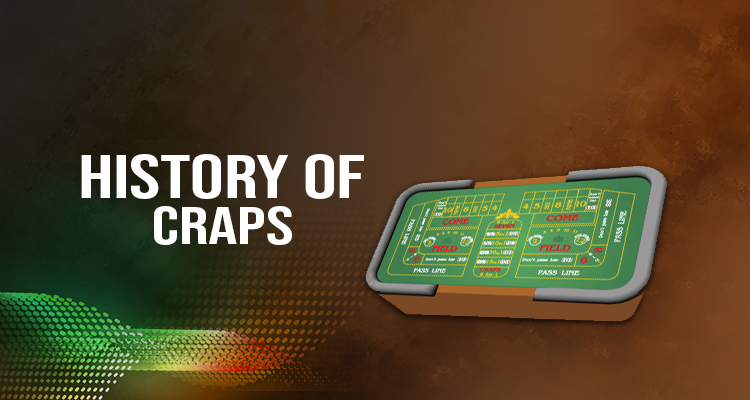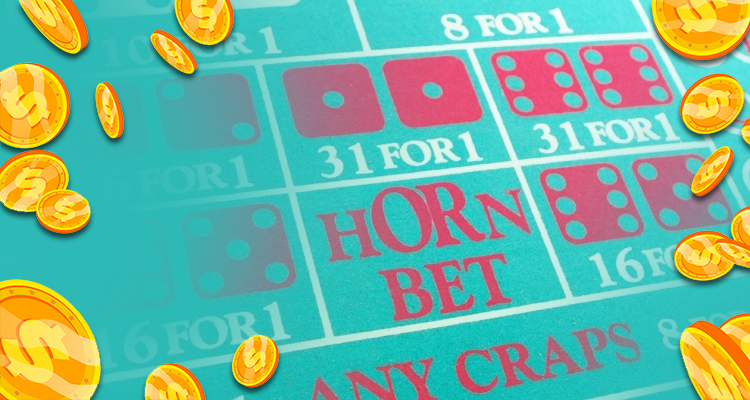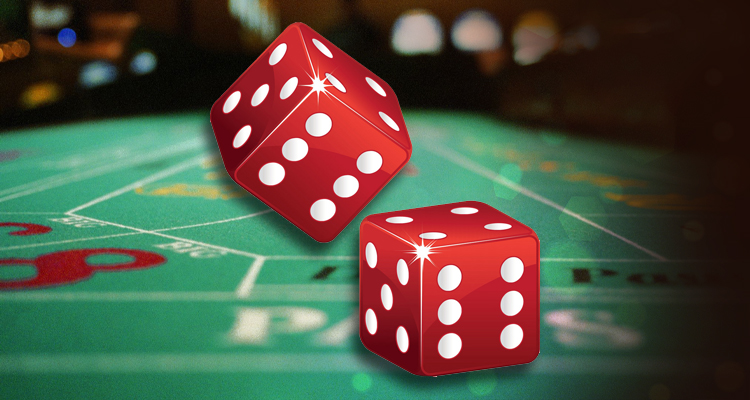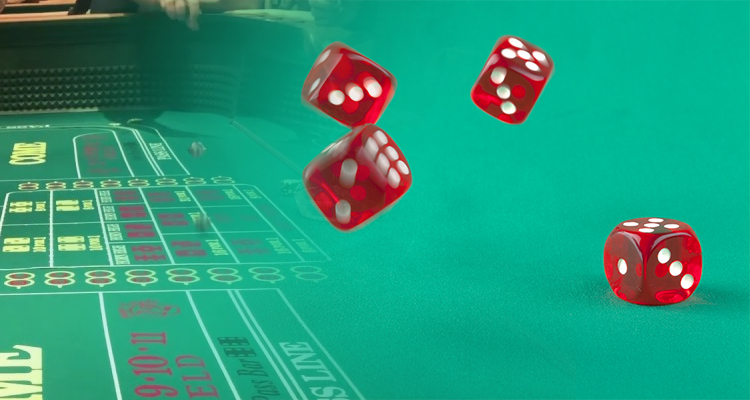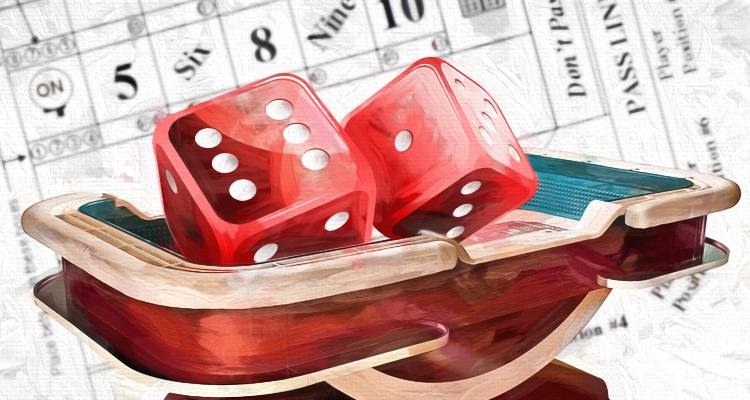Online Craps Games
Guide to Online Crap Games Around the World

The game of Craps is older than you think. Initially called Crabs, it is a casino table game played with dice. It is believed to have originated from an ancient game called Hazard, the name derived from the Arabic word az-zahr, which is the plural for dice.
How and why the game got the name Crabs is a matter of speculation and debate, but needless to say, was later called Craps as we know it today. For more history about this dice game, a comprehensive summary is available here.
The Theory of Craps
In Craps, like any other casino game, the house retains a winning odds advantage. However, there are many bets that the gambler can make that will improve their odds and conversely, there are bets that significantly increase the odds of winning for the casino. There is a bet in certain situations that can significantly increase your chance of winning or lower the house odds, but at no time does the casino lose the edge.
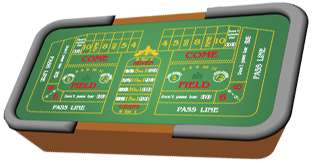
Bet Type and the House Advantage:
- Pass or Come - 1.41%
- Seven Bet - 16.67%
- Don’t Pass or Don’t Come – 1.36%
- Place Bet - 6 or 8 is 1.52%, 5 or 9 is 4%, 4 or 10 is 6.67%
- Buy or Lay – 5%
- Buy w/commission on win – 4 or 10 is 1.67%
- Field Bets – 5.56%
- 3 to 1 odds on 2s or 12s is 2.78%
- Big 6 and Big 8 – 10%
- Hard 4s/Hard 10s/ Eleven and any Craps Bet – 11.11%
Craps is mostly a game of luck rather than skill, but knowing how to play will have your odds of winning greatly improved.
Online Craps
Today, Craps is a hugely popular game and it is said that more money is wagered on it than any other table game. Many casinos throughout the world offer Craps to their gamblers and people from all walks of life enjoy the thrill it provides. It is especially popular in the United States land based casinos .
Craps games are available at almost all online casinos. They vary a bit depending on the software manufacturer.
The basic online gameplay is as follows:
The game requires one or more players. Play begins by betting on the outcome of the roll of the two dice. Bets illustrated on the table have several wager possibilities. Simply place your chips on the wager you wish to make. Once the bets are made, the shooter rolls the dice. If that first roll (the come-out roll) is a 7 or 11, it is a win, if it's a 2, 3, or 12, it is called "craps". If the roll of the dice matches the wager you placed, you're a winner. The various bets and terminology are a bit complex, but it is worth the small effort it takes to familiarize yourself with the game.
Below is a list showing availability at every casino in our database. The reviews will enable you to make a comparison of casinos and where craps is offered.
Craps Games
Frequently asked questions
It doesn't matter who wins this one bet but who ends up with all the money. The casino realizes few players are sophisticated enough to restrict their craps betting to just smart wagers.
But let's look at the bet in question, Jordan: a pass line wager. If you were to play 100 bets on the pass line, you can expect to win about 49 times and lose the other 51. The casino will gladly take this itty-bitty 49/51 ratio and multiply it by thousands of decisions daily, weekly and yearly, and guarantee themselves a generous long-term profit.
Craps with cronies can be enjoyable entertainment, and based on your pass line play, you’re already an expert amongst your friends. Still, less than one percent of players who belly up to the game understand dice as you do. Most players are greener than the felt on the table. So, Brenda, allow me to give your gambling gang and fellow readers the only bets you really want to make on a crap table. The best bets on a crap game are the pass and come line bets you subscribe to, those wagers with odds, and the placing of the 6 or 8. These three wagers have a casino edge of 1.5% or lower. Stick to these three, and you’ll be certified to get your teaching credentials.
Never Ever or Crapless Craps is ground I've plowed before, Kallan, so I’ll synopsize. You do not lose on the 2, 3, or 12 on the come out roll. Instead, if the shooter tosses the 2, 3, 11 or 12, that becomes the point, just as the 4, 5, 6, and 8, 9, 10 would in normal craps. The 7 on the come out is your only instant winner.
Two thumbs down is my recommendation for Crapless Craps. The house edge on the pass line with these modified rules is a whopping 5.4%, about four times the typical crap game's 1.4% pass line edge.
Gambling Wisdom of the Week: "Blackjack--what a game! How simple it looks, yet how complex it truly is." --Victor H. Royer
Good to hear from you again, Gurth.
Your question reminds me of the woman who complained to Dear Abby of all the violence, nudity, fowl (sic) language, and sex on her VCR.
Gaming commissions have contemplated banning "Distractive behavior" from time to time over the decades, but are still happily researching the matter. Two things you could do in self-defense:
1) Keep your head down and only make smart wagers like a pass line bet with odds or placing the 6 or 8 (you shouldn’t lose big with those wagers even against a magical blouse), or
2) Have your -- or someone's -- wife with you; women are born experts in protecting their men from such visual assaults.
My accountant (sort of a gaming historian) would like to know just where the casino is that causes you this trouble.
Gambling Wisdom of the Week: "As a lifelong poker player, I can't believe the underhanded way this new bill restricting online poker was passed through Congress. What does Internet poker have to do with the Safe Port Bill? We Texans don't like this kind of trickery. Texas is a state where you can see an enemy coming, a friend is a friend, and you look someone straight in the eyes." -- Living poker legend Doyle Brunson
There is no real easy way to break this to you so I'll get right to the point: NO! Though every dog has his day, don't expect a good week. It's not because you're making the wrong bets, nor playing smart, not even because you're not a decent, hard-working person worth more than an occasional bone tossed your way by the casino. You lack the essential component necessary to whip the casino, and no celestial spirit can help. And that, my friend, is a big-time bankroll. Why? Because the casino has a whole lot more cash and staying power than you do. In the industry, we call it "gambler's ruin." In essence, it's how long will it take you-with your limited bankroll-to lose everything to a casino, which has a relatively infinite vault of money. You come to the casino armed with X amount of dollars, and the casino has the treasures of Rome. It is the ultimate secret weapon the casino possesses. So even if you do have a short-term winning streak, when the house has this infinite stake, they can, and will, outlast you.
Test this truism out yourself. Sit at your kitchen table and play an even-up game like War with an opponent. You start off with $50 worth of monopoly money, and your adversary-we'll call him Joe Casino-begins play with $50,000. Now start playing at $5 a hand and you will immediately note some normal fluctuations inherent to gambling- like you winning six or seven hands in a row. But without fail, a losing streak will appear and your bankroll will start to deteriorate. You'll quickly notice that your modest bankroll cannot weather the bad streaks that eventually come your way. The casino can, and will, grind away at your wad of cash because their bankroll is enormous in comparison to your bets. Before long you're out of cash. A casino fatality Armageddon style. So the lesson here is that not even an archangel will help you become a "consistent winner." Only a Catholic Church size bankroll can.
Nothing! There is never a need to be embarrassed, Meg. You are to be applauded for asking for help. All too many players try to cover up their shortcomings and waste their hard-earned money playing casino games they know little about. So no question regarding gambling is "dumb." Well, that's not quite true. I was dealing blackjack late one evening in downtown Reno when a man approached me and asked: "Where are the slot machines for kids?" That was dumb. No, pathetic.
There are oodles of variables, Ray, but with only finite space to hash over them, here’s the bottom line, life preserver attached: It depends on how the games are played, and which bets you make on those games.
To illustrate, take craps. The house edge on this game can be anywhere from 0.18% to 16.1%. Optimal strategy would be betting on the pass line and taking 10X odds. You’ve now reduced the house edge to 0.18%. With 5X odds the casino advantage is only 0.32%, which is still a far better than a bet on the bank hand in baccarat which carries a casino advantage of 1.17%, or a slightly lower 1.06% if you can find a game that offers only a 4% commission on that wager.
Single deck blackjack with favorable rules, along with employing perfect basic strategy does put the house edge under 1%, but still, unless you are a sophisticated card counter, a pass line bet with full odds would be the "best bet" of the three.
Bellying up to a crap table with $100 and expecting to win $1,000 is, at best, unrealistic. Personally, I believe it's downright wacky. Odds-on you will lose your C-note long before you win a grand.
Skip, you need to set reasonable win goals, like 50% of your original stake, not 1000% on your money. Far too many players keep upping the ante on what they want to win. This columnist recommends having predetermined loss limits and "realistic" win goals.
It takes internal fortitude to take a small win and run. I'm not asking you to quit while you are on an eventful winning streak, but true winners know how to quit when they are ahead. They don't risk it all to achieve too lofty a reward.
Because I can predict with 100% certainty that every casino has at least one lazy pit boss-I was one-you can be assured that the dice placed on the game are near perfect. The perks for this idle behavior? Going up to the boss's office and inspecting dice. This meant feet on the head honcho's desk, Oprah on the tube and talking on the phone long distance to friends and family because I knew the secret dial code. Oh, and inspecting dice with a micrometer to make sure our dice were produced to a tolerance level of .0005 of an inch.
But we were the second line of defense. Dice makers who cut this poly-sorbate plastic in lots of five or six deal intolerances of .0002, with imperfections discarded, making the random nature of a dice throw a certainty.
By the way, Steve, no not you, Steve, my former boss Steve. You never asked, but those long distance calls to Michigan were probably mine.


